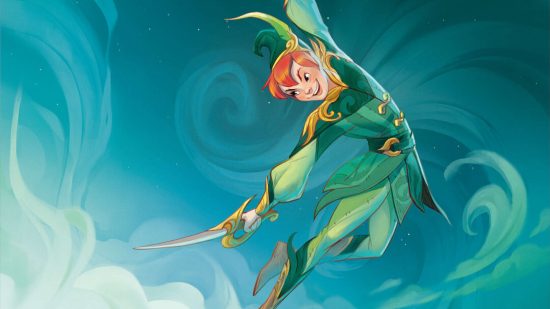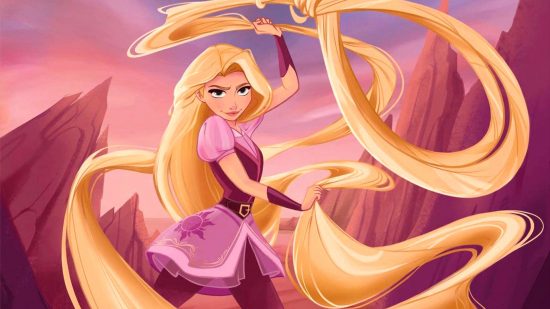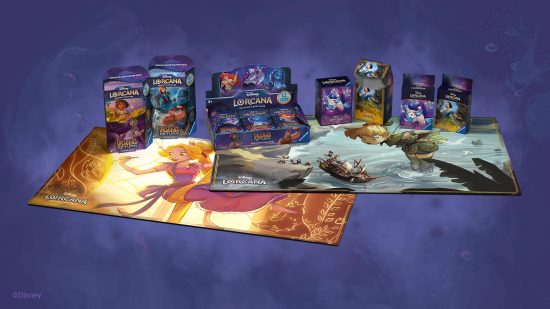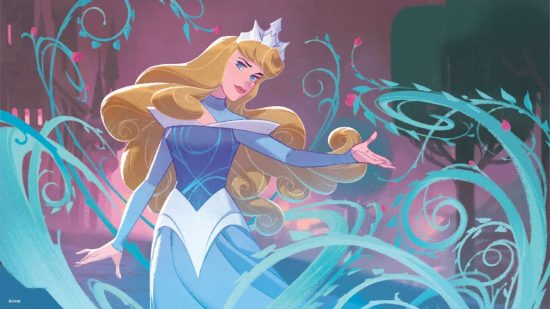Starting at the end of May, Disney Lorcana tournament attendees in North America and Europe will face a new form of Lorcana Challenge events – an innovative new two-game round format that its creators hope will lead to “faster-paced gameplay” and “more efficient and engaging tournaments”. Game Development Manager Tim Schilder filled Wargamer in on the details in an exclusive interview.
Disney Lorcana’s popularity has been explosive, with early Lorcana Challenge events selling out within minutes of tickets going on sale. You’ll find plenty of online Lorcana discussions between fans trying to optimize their decks for competitive play and seeking out the best Lorcana cards to tackle the meta. All that makes a smooth and enjoyable tournament experience so much more important.
The new Lorcana Challenge format will forgo traditional best-of-one or best-of-three rounds, instead borrowing a note from sports that run paired ‘home and away’ games. Players will play two games each round, earning three points for each win, and a bonus point for winning both games. This scoring system – and a number of tie-breakers – will determine the top cut players, who then compete in traditional, single elimination, best-of-three rounds.
Early in development the team was bouncing back and forth between best-of-one and best-of-three, but nothing felt right. Lorcana’s Co-Designer Steve Warner first suggested two-game rounds, Schilder recalls. “When I realized he wasn’t joking I started spinning the idea around in my head and the more I thought about it, the more I was hooked that this was the answer.”
The new two-game format will mean that many rounds don’t have a definitive winner. But according to Schilder, this is a feature, not a bug. “Slow play and intentional draws” have proven to be a problem in best-of-three tournaments, as players who have won one match and lost another run down the clock to guarantee a draw when they suspect the alternative is to lose.
That isn’t a problem in two-game rounds. “We have noticed a significant decrease in games going to time or instances where players end up not finishing the game – even though we have reduced the round time to 45 minutes”. There are also no instances of players losing two matches in a row and having to sit on their thumbs while they wait for other players to finish a third game.
With the Disney license attached to a whip-smart game engine, Lorcana attracts diverse players, ranging from children to tournament grinders – and of course, tournament grinders who are also children. Schilder says that two-round has received “extensive playtesting sessions” with both internal tests and external simulated tournaments, with playtesters ranging “from young players to adults”.
“Competitive players approached the format with skepticism” Schilder says, but “most of them liked the system after experiencing it”. He notes: “it can be tricky to predict all reactions and scenarios during playtesting, so we’re always listening to players who participate in real-life tournaments and taking their experiences into consideration”.
That feedback is evident in the finalised scoring system for the new format. Originally, players only received a single point for winning a match, so the bonus point they got for winning both games in a round was weighted the same as a match win. This was a hotly debated point among competitive players, which lead to the current weighting.
Schilder sees new strategic challenges for players under the new format. “I personally love that this format makes players think more strategically about how their deck plays when going first versus how it plays when going second”, he says.
Two-round should also help to reduce feel-bad moments. “If you win the first game in a best-of-three but lose the other two, you don’t usually end up getting anything”, Schilder notes. This points-driven format ensures “every game matters” and contributes to your final standing – and player’s scores are much more easily comprehensible, great for players who want to track their personal performance.
The reduced downtime and clearer scoring should be welcome for spectators, whether they’re avidly following the competitive circuit, or supporting a young Illumineer.

If you’ve never played in a tournament before, we heartily recommend giving it a shot – get upgrading your Lorcana starter decks into something fierce! The video by The Inkwell, embedded above, explains the Lorcana Challenge, the premiere event series, and there are many more local events organised by stores.
We’ll be watching the Lorcana tournament scene to see how the new format fares once it’s out in the wild – perhaps other trading card games will take note and implement it, if it proves sufficiently popular. To keep up to speed with Lorcana news, you can follow Wargamer on Google news.



